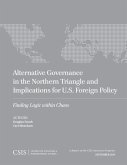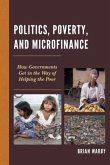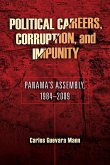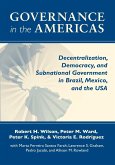Tatiana Berringer
Brazilian Bourgeoisie and Foreign Policy
28,99 €
inkl. MwSt.
Versandfertig in über 4 Wochen

14 °P sammeln
Tatiana Berringer
Brazilian Bourgeoisie and Foreign Policy
- Broschiertes Buch
- Merkliste
- Auf die Merkliste
- Bewerten Bewerten
- Teilen
- Produkt teilen
- Produkterinnerung
- Produkterinnerung
What were the changes in the international position of the Brazilian state during the Lula and Cardoso administrations? How were the classes and class fractions represented? These are the questions that Tatiana Berringer's work seeks to answer. Using the theoretical instruments of the Marxist Nicos Poulantzas, Brazilian Bourgeoisie and Foreign Policy identifies the class interests that directed the international action of the Brazilian state. With notable originality, the text presents, theoretically and empirically, a truly consistent Marxist analysis of Brazilian foreign policy, as well as a…mehr
Andere Kunden interessierten sich auch für
![Globalizing the Caribbean: Political Economy, Social Change, and the Transnational Capitalist Class Globalizing the Caribbean: Political Economy, Social Change, and the Transnational Capitalist Class]() Jeb SpragueGlobalizing the Caribbean: Political Economy, Social Change, and the Transnational Capitalist Class33,99 €
Jeb SpragueGlobalizing the Caribbean: Political Economy, Social Change, and the Transnational Capitalist Class33,99 €![Intraregional Migration in Latin America: Psychological Perspectives on Acculturation and Intergroup Relations Intraregional Migration in Latin America: Psychological Perspectives on Acculturation and Intergroup Relations]() Intraregional Migration in Latin America: Psychological Perspectives on Acculturation and Intergroup Relations73,99 €
Intraregional Migration in Latin America: Psychological Perspectives on Acculturation and Intergroup Relations73,99 €![Alternative Governance in the Northern Triangle and Implications for U.S. Foreign Policy Alternative Governance in the Northern Triangle and Implications for U.S. Foreign Policy]() Douglas FarahAlternative Governance in the Northern Triangle and Implications for U.S. Foreign Policy65,99 €
Douglas FarahAlternative Governance in the Northern Triangle and Implications for U.S. Foreign Policy65,99 €![Politics, Poverty, and Microfinance Politics, Poverty, and Microfinance]() Brian WarbyPolitics, Poverty, and Microfinance57,99 €
Brian WarbyPolitics, Poverty, and Microfinance57,99 €![Political Careers, Corruption, and Impunity Political Careers, Corruption, and Impunity]() Carlos Guevara MannPolitical Careers, Corruption, and Impunity51,99 €
Carlos Guevara MannPolitical Careers, Corruption, and Impunity51,99 €![Governance in the Americas Governance in the Americas]() Robert H WilsonGovernance in the Americas36,99 €
Robert H WilsonGovernance in the Americas36,99 €![Parcels: Memories of Salvadoran Migration Parcels: Memories of Salvadoran Migration]() Mike AnastarioParcels: Memories of Salvadoran Migration37,99 €
Mike AnastarioParcels: Memories of Salvadoran Migration37,99 €-
-
-
What were the changes in the international position of the Brazilian state during the Lula and Cardoso administrations? How were the classes and class fractions represented? These are the questions that Tatiana Berringer's work seeks to answer. Using the theoretical instruments of the Marxist Nicos Poulantzas, Brazilian Bourgeoisie and Foreign Policy identifies the class interests that directed the international action of the Brazilian state. With notable originality, the text presents, theoretically and empirically, a truly consistent Marxist analysis of Brazilian foreign policy, as well as a rich interpretation of the class struggle in current Brazilian politics. The author offers the reader her reflections on the political crisis of 2016 and the foreign policy of the Dilma, Temer, and Bolsonaro governments.
Hinweis: Dieser Artikel kann nur an eine deutsche Lieferadresse ausgeliefert werden.
Hinweis: Dieser Artikel kann nur an eine deutsche Lieferadresse ausgeliefert werden.
Produktdetails
- Produktdetails
- Verlag: Haymarket Books
- Seitenzahl: 234
- Erscheinungstermin: 2. April 2024
- Englisch
- Abmessung: 229mm x 152mm x 13mm
- Gewicht: 340g
- ISBN-13: 9798888902219
- Artikelnr.: 69929753
- Herstellerkennzeichnung
- Libri GmbH
- Europaallee 1
- 36244 Bad Hersfeld
- gpsr@libri.de
- Verlag: Haymarket Books
- Seitenzahl: 234
- Erscheinungstermin: 2. April 2024
- Englisch
- Abmessung: 229mm x 152mm x 13mm
- Gewicht: 340g
- ISBN-13: 9798888902219
- Artikelnr.: 69929753
- Herstellerkennzeichnung
- Libri GmbH
- Europaallee 1
- 36244 Bad Hersfeld
- gpsr@libri.de
Tatiana Berringer is Assistant Professor of International Relations at Federal University of ABC (Brazil). She is a member of the editorial board of Crítica Marxista (Brazil) and of the Brazilian Foreign Policy and International Insertion Observatory (opep.org). She coordinates the Social Classes and Foreign Policy Group Research (CNPQ).
Foreword
Preface
Acknowledgements
List of Figures and Tables
Abbreviations and Acronyms
Introduction
1 Power Bloc: Brazilian Theory and Policy
1 Theory: The Power Bloc and International Relations
2 Theory: Power Bloc and Foreign Policy Analysis
2 The fhc Governments: Neoliberalism, Power Bloc and Foreign Policy
1 Neoliberalism
2 Neoliberalism and the Power Bloc in Brazil
3 Foreign Policy in the fhc Governments
3.1 Adherence to the Missile Technology Control Regime ( mtcr )
3.2 The Efforts to Reactivate the InterAmerican Treaty for Reciprocal
Assistance ( itra )
3.3 ftaa , mercosur and the Internal Bourgeoisie
3.4 Regional Politics between 1998 and 2000: The mercosur Crisis and the
Launching of the irsa i
3.5 The Lafer Administration and the Brazilian State’s Passive
Subordination to Imperialism
3.6 The 2002 Elections
3.7 The ftaa and the 2002 Elections
3.8 The Internal Bourgeoisie and the 2002 Election
3.9 The pt and the 2002 Elections
3 The Lula Governments: Neo-developmentalism, Power Bloc and Foreign Policy
1 Neo-developmentalism and Power Bloc
1.1 A Brief Review of Some of the Analytical Literature on the Lula
Governments’ Social and Economic Policies
2 Foreign Policy during the Lula Governments
2.1 South-South Coalitions
2.2 Haiti
2.3 Regional Integration
2.4 Africa
2.5 The Middle East
2.6 China
2.7 European Union
2.8 The imf
2.9 The United States
2.10 Defense Policy
2.11 The Lula Governments’ Foreign Policy and the Neo-developmentalist
Front
2.12 The Brazilian State’s Position in Regard to Imperialism
2.13 The Political Organization of the Neo-developmentalist Front
2.14 The Internal Bourgeoisie and the South-South Foreign Policy
2.15 Contradictions among Sectors Composing the Internal Bourgeoisie
2.16 The Unstable Equilibrium of Compromises and Foreign Policy
2.17 The Party-Political Dispute and Foreign Policy
4 Brazil and South America
1 Brazilian State and South America: Imperialism, Sub-imperialism and
Neo-developmentalism
1.1 Brazilian Imperialism
1.2 Brazilian Sub-imperialism
1.3 Neo-developmentalism and Regional Politics
2 People’s Movements and Unionism in Relation to Regional Integration
Processes in South America
2.1 Brazilian People’s Movements and Unionism and Regional Integration in
the 1980s and 1990s
2.2 The People’s Classes and Regional Integration during the pt
Governments
5 Brazil under fhc and Lula
6 Power Bloc and Foreign Policy in the Dilma, Temer and Bolsonaro
Governments
1 The Dilma Government: Foreign Policy, Political Crisis and Power Bloc
1.1 Foreign Policy in the Dilma Governments
1.2 The Power Bloc, the Political Crisis and Foreign Policy
2 The Temer Government and the Return to Passive Subordination
2.1 Brazil’s Trade and Production Structures Compared with the World
2.2 The Brazilian State’s Re-embracing of Passive Subordination
2.3 Decadent External Insertion and Dependent Productive Structure
2.4 ‘Weak Meat’
3 The Bolsonaro Government and Its Explicit Passive Subordination to
Imperialism: The Neofascist Alliance
3.1 Foreign Policies of the Bolsonaro Government and the Trump Government:
The Neofascist Alliance
3.2 A New Stage in Brazil-USA Relations: The Biden Government
References
Index
Preface
Acknowledgements
List of Figures and Tables
Abbreviations and Acronyms
Introduction
1 Power Bloc: Brazilian Theory and Policy
1 Theory: The Power Bloc and International Relations
2 Theory: Power Bloc and Foreign Policy Analysis
2 The fhc Governments: Neoliberalism, Power Bloc and Foreign Policy
1 Neoliberalism
2 Neoliberalism and the Power Bloc in Brazil
3 Foreign Policy in the fhc Governments
3.1 Adherence to the Missile Technology Control Regime ( mtcr )
3.2 The Efforts to Reactivate the InterAmerican Treaty for Reciprocal
Assistance ( itra )
3.3 ftaa , mercosur and the Internal Bourgeoisie
3.4 Regional Politics between 1998 and 2000: The mercosur Crisis and the
Launching of the irsa i
3.5 The Lafer Administration and the Brazilian State’s Passive
Subordination to Imperialism
3.6 The 2002 Elections
3.7 The ftaa and the 2002 Elections
3.8 The Internal Bourgeoisie and the 2002 Election
3.9 The pt and the 2002 Elections
3 The Lula Governments: Neo-developmentalism, Power Bloc and Foreign Policy
1 Neo-developmentalism and Power Bloc
1.1 A Brief Review of Some of the Analytical Literature on the Lula
Governments’ Social and Economic Policies
2 Foreign Policy during the Lula Governments
2.1 South-South Coalitions
2.2 Haiti
2.3 Regional Integration
2.4 Africa
2.5 The Middle East
2.6 China
2.7 European Union
2.8 The imf
2.9 The United States
2.10 Defense Policy
2.11 The Lula Governments’ Foreign Policy and the Neo-developmentalist
Front
2.12 The Brazilian State’s Position in Regard to Imperialism
2.13 The Political Organization of the Neo-developmentalist Front
2.14 The Internal Bourgeoisie and the South-South Foreign Policy
2.15 Contradictions among Sectors Composing the Internal Bourgeoisie
2.16 The Unstable Equilibrium of Compromises and Foreign Policy
2.17 The Party-Political Dispute and Foreign Policy
4 Brazil and South America
1 Brazilian State and South America: Imperialism, Sub-imperialism and
Neo-developmentalism
1.1 Brazilian Imperialism
1.2 Brazilian Sub-imperialism
1.3 Neo-developmentalism and Regional Politics
2 People’s Movements and Unionism in Relation to Regional Integration
Processes in South America
2.1 Brazilian People’s Movements and Unionism and Regional Integration in
the 1980s and 1990s
2.2 The People’s Classes and Regional Integration during the pt
Governments
5 Brazil under fhc and Lula
6 Power Bloc and Foreign Policy in the Dilma, Temer and Bolsonaro
Governments
1 The Dilma Government: Foreign Policy, Political Crisis and Power Bloc
1.1 Foreign Policy in the Dilma Governments
1.2 The Power Bloc, the Political Crisis and Foreign Policy
2 The Temer Government and the Return to Passive Subordination
2.1 Brazil’s Trade and Production Structures Compared with the World
2.2 The Brazilian State’s Re-embracing of Passive Subordination
2.3 Decadent External Insertion and Dependent Productive Structure
2.4 ‘Weak Meat’
3 The Bolsonaro Government and Its Explicit Passive Subordination to
Imperialism: The Neofascist Alliance
3.1 Foreign Policies of the Bolsonaro Government and the Trump Government:
The Neofascist Alliance
3.2 A New Stage in Brazil-USA Relations: The Biden Government
References
Index
Foreword
Preface
Acknowledgements
List of Figures and Tables
Abbreviations and Acronyms
Introduction
1 Power Bloc: Brazilian Theory and Policy
1 Theory: The Power Bloc and International Relations
2 Theory: Power Bloc and Foreign Policy Analysis
2 The fhc Governments: Neoliberalism, Power Bloc and Foreign Policy
1 Neoliberalism
2 Neoliberalism and the Power Bloc in Brazil
3 Foreign Policy in the fhc Governments
3.1 Adherence to the Missile Technology Control Regime ( mtcr )
3.2 The Efforts to Reactivate the InterAmerican Treaty for Reciprocal
Assistance ( itra )
3.3 ftaa , mercosur and the Internal Bourgeoisie
3.4 Regional Politics between 1998 and 2000: The mercosur Crisis and the
Launching of the irsa i
3.5 The Lafer Administration and the Brazilian State’s Passive
Subordination to Imperialism
3.6 The 2002 Elections
3.7 The ftaa and the 2002 Elections
3.8 The Internal Bourgeoisie and the 2002 Election
3.9 The pt and the 2002 Elections
3 The Lula Governments: Neo-developmentalism, Power Bloc and Foreign Policy
1 Neo-developmentalism and Power Bloc
1.1 A Brief Review of Some of the Analytical Literature on the Lula
Governments’ Social and Economic Policies
2 Foreign Policy during the Lula Governments
2.1 South-South Coalitions
2.2 Haiti
2.3 Regional Integration
2.4 Africa
2.5 The Middle East
2.6 China
2.7 European Union
2.8 The imf
2.9 The United States
2.10 Defense Policy
2.11 The Lula Governments’ Foreign Policy and the Neo-developmentalist
Front
2.12 The Brazilian State’s Position in Regard to Imperialism
2.13 The Political Organization of the Neo-developmentalist Front
2.14 The Internal Bourgeoisie and the South-South Foreign Policy
2.15 Contradictions among Sectors Composing the Internal Bourgeoisie
2.16 The Unstable Equilibrium of Compromises and Foreign Policy
2.17 The Party-Political Dispute and Foreign Policy
4 Brazil and South America
1 Brazilian State and South America: Imperialism, Sub-imperialism and
Neo-developmentalism
1.1 Brazilian Imperialism
1.2 Brazilian Sub-imperialism
1.3 Neo-developmentalism and Regional Politics
2 People’s Movements and Unionism in Relation to Regional Integration
Processes in South America
2.1 Brazilian People’s Movements and Unionism and Regional Integration in
the 1980s and 1990s
2.2 The People’s Classes and Regional Integration during the pt
Governments
5 Brazil under fhc and Lula
6 Power Bloc and Foreign Policy in the Dilma, Temer and Bolsonaro
Governments
1 The Dilma Government: Foreign Policy, Political Crisis and Power Bloc
1.1 Foreign Policy in the Dilma Governments
1.2 The Power Bloc, the Political Crisis and Foreign Policy
2 The Temer Government and the Return to Passive Subordination
2.1 Brazil’s Trade and Production Structures Compared with the World
2.2 The Brazilian State’s Re-embracing of Passive Subordination
2.3 Decadent External Insertion and Dependent Productive Structure
2.4 ‘Weak Meat’
3 The Bolsonaro Government and Its Explicit Passive Subordination to
Imperialism: The Neofascist Alliance
3.1 Foreign Policies of the Bolsonaro Government and the Trump Government:
The Neofascist Alliance
3.2 A New Stage in Brazil-USA Relations: The Biden Government
References
Index
Preface
Acknowledgements
List of Figures and Tables
Abbreviations and Acronyms
Introduction
1 Power Bloc: Brazilian Theory and Policy
1 Theory: The Power Bloc and International Relations
2 Theory: Power Bloc and Foreign Policy Analysis
2 The fhc Governments: Neoliberalism, Power Bloc and Foreign Policy
1 Neoliberalism
2 Neoliberalism and the Power Bloc in Brazil
3 Foreign Policy in the fhc Governments
3.1 Adherence to the Missile Technology Control Regime ( mtcr )
3.2 The Efforts to Reactivate the InterAmerican Treaty for Reciprocal
Assistance ( itra )
3.3 ftaa , mercosur and the Internal Bourgeoisie
3.4 Regional Politics between 1998 and 2000: The mercosur Crisis and the
Launching of the irsa i
3.5 The Lafer Administration and the Brazilian State’s Passive
Subordination to Imperialism
3.6 The 2002 Elections
3.7 The ftaa and the 2002 Elections
3.8 The Internal Bourgeoisie and the 2002 Election
3.9 The pt and the 2002 Elections
3 The Lula Governments: Neo-developmentalism, Power Bloc and Foreign Policy
1 Neo-developmentalism and Power Bloc
1.1 A Brief Review of Some of the Analytical Literature on the Lula
Governments’ Social and Economic Policies
2 Foreign Policy during the Lula Governments
2.1 South-South Coalitions
2.2 Haiti
2.3 Regional Integration
2.4 Africa
2.5 The Middle East
2.6 China
2.7 European Union
2.8 The imf
2.9 The United States
2.10 Defense Policy
2.11 The Lula Governments’ Foreign Policy and the Neo-developmentalist
Front
2.12 The Brazilian State’s Position in Regard to Imperialism
2.13 The Political Organization of the Neo-developmentalist Front
2.14 The Internal Bourgeoisie and the South-South Foreign Policy
2.15 Contradictions among Sectors Composing the Internal Bourgeoisie
2.16 The Unstable Equilibrium of Compromises and Foreign Policy
2.17 The Party-Political Dispute and Foreign Policy
4 Brazil and South America
1 Brazilian State and South America: Imperialism, Sub-imperialism and
Neo-developmentalism
1.1 Brazilian Imperialism
1.2 Brazilian Sub-imperialism
1.3 Neo-developmentalism and Regional Politics
2 People’s Movements and Unionism in Relation to Regional Integration
Processes in South America
2.1 Brazilian People’s Movements and Unionism and Regional Integration in
the 1980s and 1990s
2.2 The People’s Classes and Regional Integration during the pt
Governments
5 Brazil under fhc and Lula
6 Power Bloc and Foreign Policy in the Dilma, Temer and Bolsonaro
Governments
1 The Dilma Government: Foreign Policy, Political Crisis and Power Bloc
1.1 Foreign Policy in the Dilma Governments
1.2 The Power Bloc, the Political Crisis and Foreign Policy
2 The Temer Government and the Return to Passive Subordination
2.1 Brazil’s Trade and Production Structures Compared with the World
2.2 The Brazilian State’s Re-embracing of Passive Subordination
2.3 Decadent External Insertion and Dependent Productive Structure
2.4 ‘Weak Meat’
3 The Bolsonaro Government and Its Explicit Passive Subordination to
Imperialism: The Neofascist Alliance
3.1 Foreign Policies of the Bolsonaro Government and the Trump Government:
The Neofascist Alliance
3.2 A New Stage in Brazil-USA Relations: The Biden Government
References
Index







